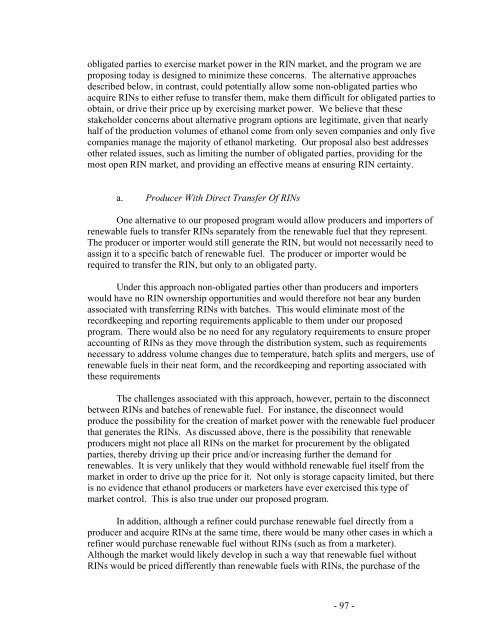Regulation of Fuels and Fuel Additives: Renewable Fuel Standard ...
Regulation of Fuels and Fuel Additives: Renewable Fuel Standard ...
Regulation of Fuels and Fuel Additives: Renewable Fuel Standard ...
You also want an ePaper? Increase the reach of your titles
YUMPU automatically turns print PDFs into web optimized ePapers that Google loves.
obligated parties to exercise market power in the RIN market, <strong>and</strong> the program we are<br />
proposing today is designed to minimize these concerns. The alternative approaches<br />
described below, in contrast, could potentially allow some non-obligated parties who<br />
acquire RINs to either refuse to transfer them, make them difficult for obligated parties to<br />
obtain, or drive their price up by exercising market power. We believe that these<br />
stakeholder concerns about alternative program options are legitimate, given that nearly<br />
half <strong>of</strong> the production volumes <strong>of</strong> ethanol come from only seven companies <strong>and</strong> only five<br />
companies manage the majority <strong>of</strong> ethanol marketing. Our proposal also best addresses<br />
other related issues, such as limiting the number <strong>of</strong> obligated parties, providing for the<br />
most open RIN market, <strong>and</strong> providing an effective means at ensuring RIN certainty.<br />
a. Producer With Direct Transfer Of RINs<br />
One alternative to our proposed program would allow producers <strong>and</strong> importers <strong>of</strong><br />
renewable fuels to transfer RINs separately from the renewable fuel that they represent.<br />
The producer or importer would still generate the RIN, but would not necessarily need to<br />
assign it to a specific batch <strong>of</strong> renewable fuel. The producer or importer would be<br />
required to transfer the RIN, but only to an obligated party.<br />
Under this approach non-obligated parties other than producers <strong>and</strong> importers<br />
would have no RIN ownership opportunities <strong>and</strong> would therefore not bear any burden<br />
associated with transferring RINs with batches. This would eliminate most <strong>of</strong> the<br />
recordkeeping <strong>and</strong> reporting requirements applicable to them under our proposed<br />
program. There would also be no need for any regulatory requirements to ensure proper<br />
accounting <strong>of</strong> RINs as they move through the distribution system, such as requirements<br />
necessary to address volume changes due to temperature, batch splits <strong>and</strong> mergers, use <strong>of</strong><br />
renewable fuels in their neat form, <strong>and</strong> the recordkeeping <strong>and</strong> reporting associated with<br />
these requirements<br />
The challenges associated with this approach, however, pertain to the disconnect<br />
between RINs <strong>and</strong> batches <strong>of</strong> renewable fuel. For instance, the disconnect would<br />
produce the possibility for the creation <strong>of</strong> market power with the renewable fuel producer<br />
that generates the RINs. As discussed above, there is the possibility that renewable<br />
producers might not place all RINs on the market for procurement by the obligated<br />
parties, thereby driving up their price <strong>and</strong>/or increasing further the dem<strong>and</strong> for<br />
renewables. It is very unlikely that they would withhold renewable fuel itself from the<br />
market in order to drive up the price for it. Not only is storage capacity limited, but there<br />
is no evidence that ethanol producers or marketers have ever exercised this type <strong>of</strong><br />
market control. This is also true under our proposed program.<br />
In addition, although a refiner could purchase renewable fuel directly from a<br />
producer <strong>and</strong> acquire RINs at the same time, there would be many other cases in which a<br />
refiner would purchase renewable fuel without RINs (such as from a marketer).<br />
Although the market would likely develop in such a way that renewable fuel without<br />
RINs would be priced differently than renewable fuels with RINs, the purchase <strong>of</strong> the<br />
- 97 -
















